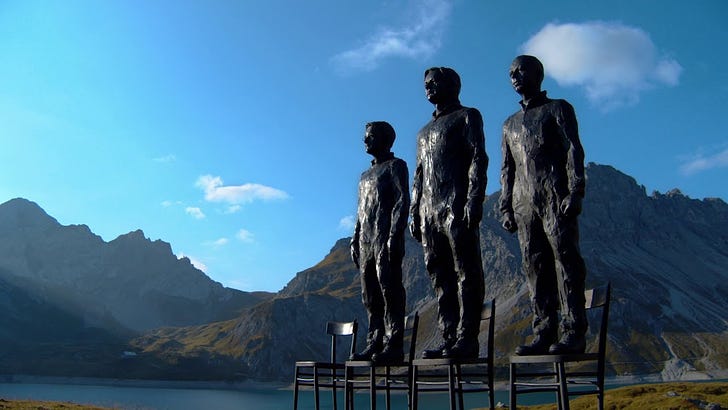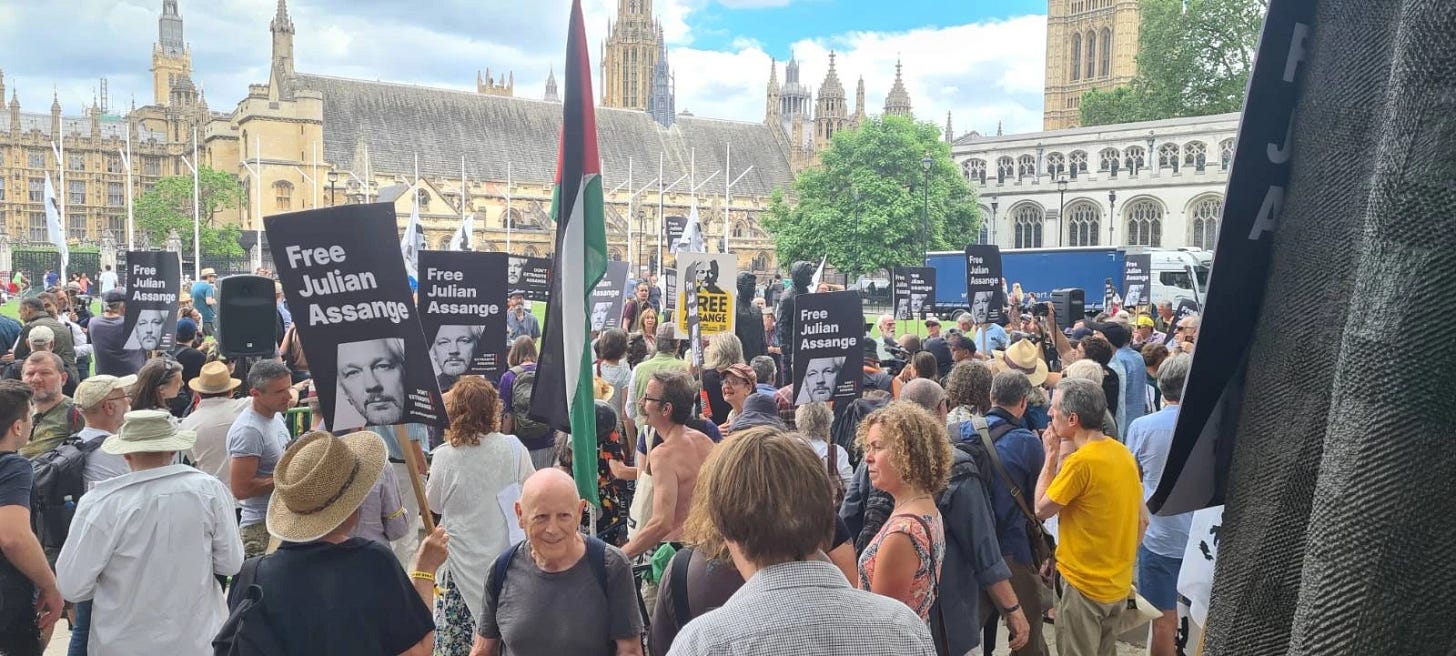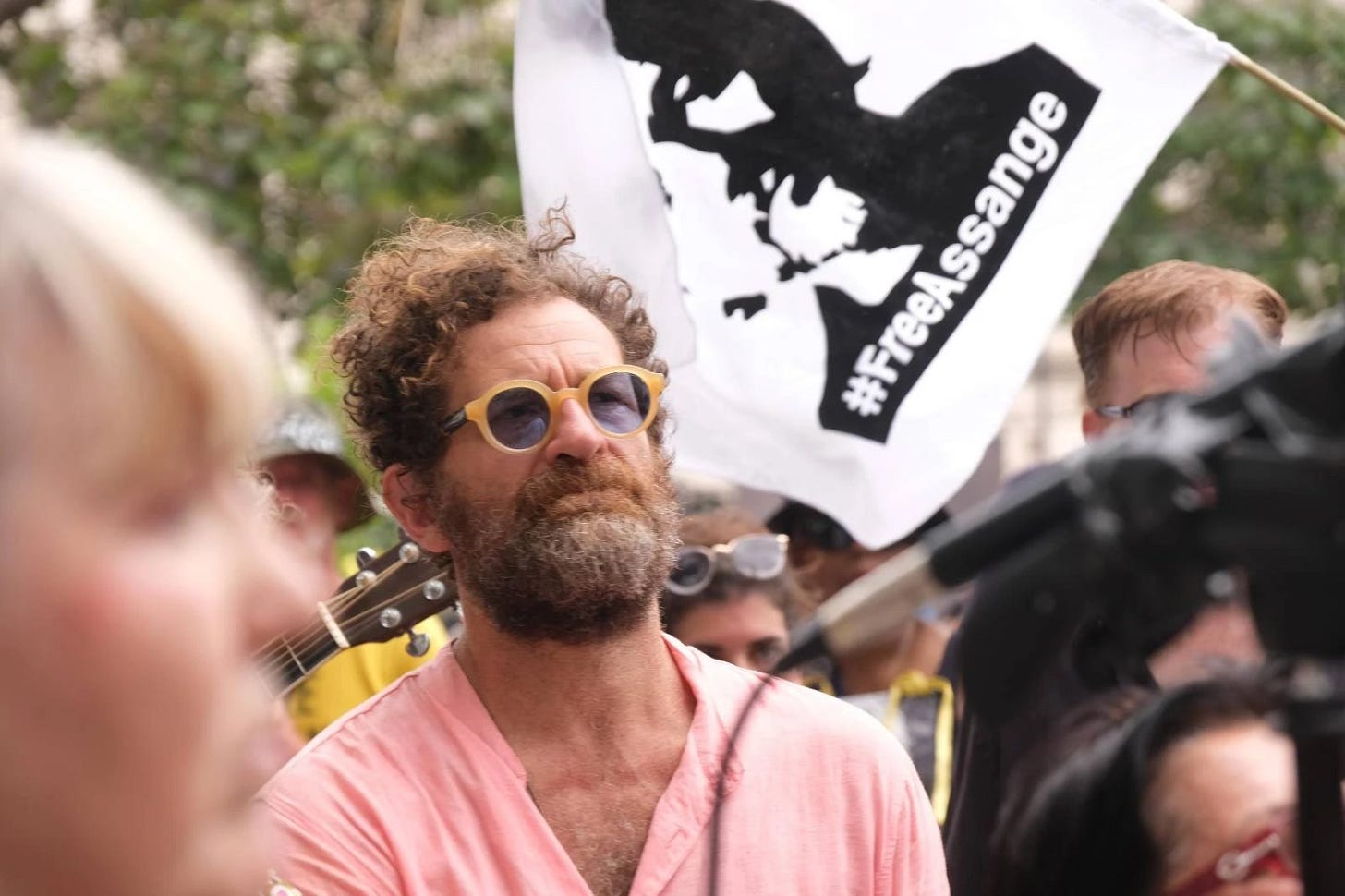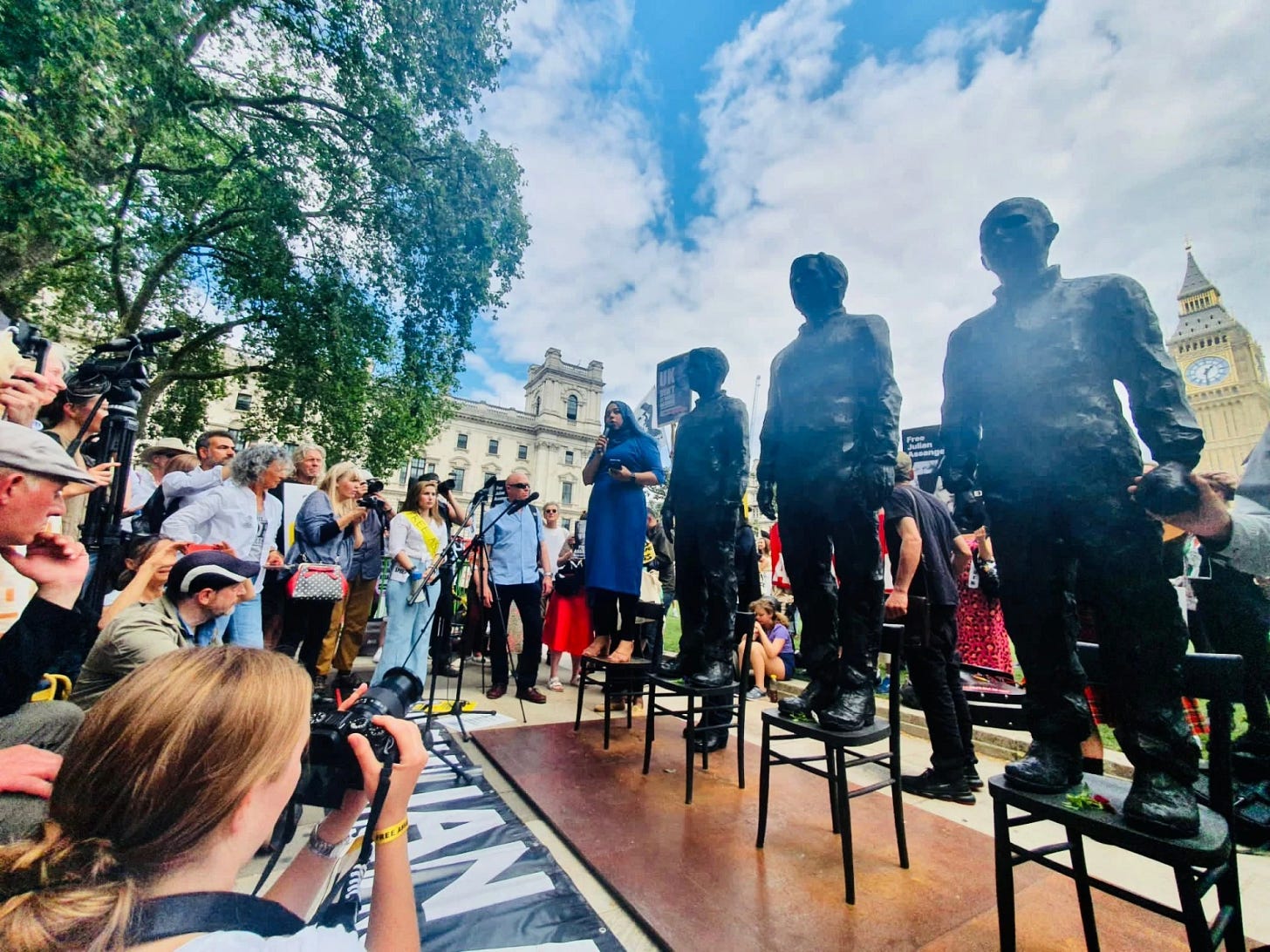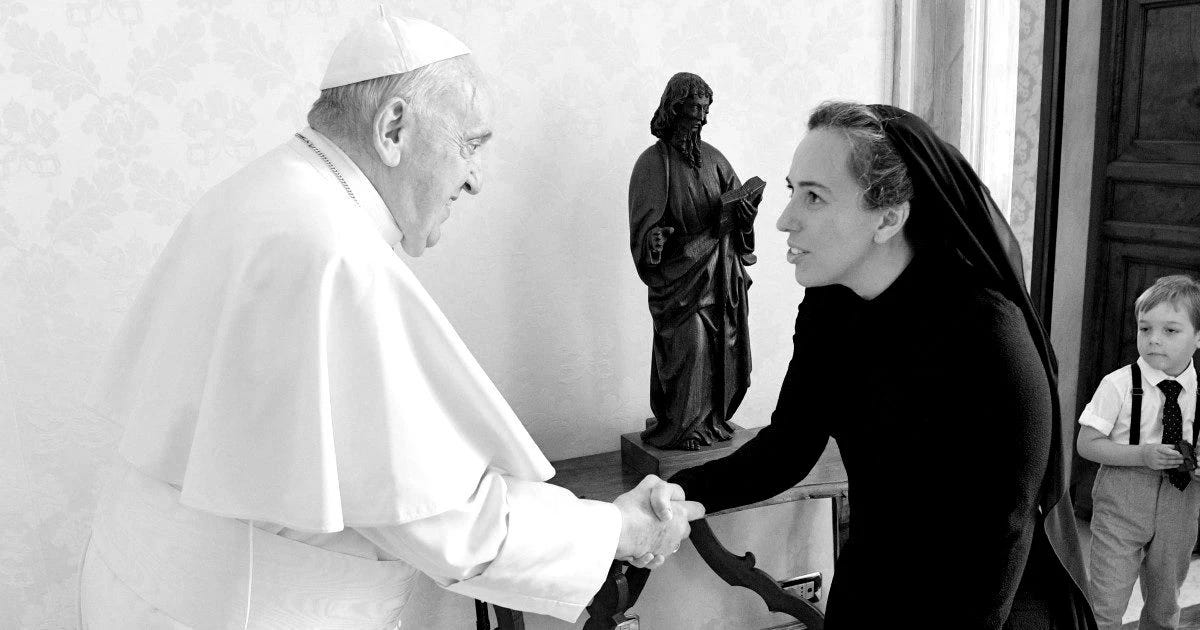👁🗨 "Anything to say ?" face au Parlement britannique
La loi a échoué, la politique a échoué, la démocratie a échoué. Mais nous ne nous arrêtons pas. Si Julian Assange est sauvé, ce sera uniquement grâce à la pression publique.
👁🗨 "Anything to say ?" face au Parlement britannique
Par Daniela Tomé pour HumanaResistencia, le 6 juillet 2023 - English version below
Davide est l'auteur de "Anything to Say ?", une sculpture qui aborde plusieurs thèmes, le droit d'expression, la liberté de la presse et la figure des lanceurs d'alerte, si essentielle en ces temps où le pouvoir est géré sans scrupules par corrompus et criminels qui ne pensent qu'à tout détruire sur leur passage pour tenter de perpétuer leurs intérêts.
La sculpture est composée de trois personnages, Manning, Assange au centre, et Snowden, et d'une chaise vide sur le côté afin que les gens puissent interagir avec l'œuvre, et se joindre à la protestation.
Elle a également été inspirée par une coutume britannique particulière : pour protester contre la reine, il était interdit de fouler le sol britannique, si bien qu'en pratique, les gens grimpaient sur un banc ou une échelle.
Davide, depuis que vous avez réalisé l'œuvre "Anything to Say ?", celle-ci n'a pas cessé de rendre visibles les injustices commises à l'encontre des lanceurs d'alerte et des journalistes tels que Snowden, Manning et Julian Assange lui-même, l'œuvre a parcouru un long chemin, mais qu'est-ce que cela vous a fait d'emmener l'œuvre en Australie, et plus précisément sur le territoire de Julian Assange ? Qu'avez-vous ressenti à ce moment-là ?
Le voyage de “Anything to say ?” a commencé le 1er mai 2015 à Berlin. Depuis, l'œuvre s'est arrêtée dans 22 capitales européennes et internationales. Dans l'ordre chronologique, la dernière a été Londres, le 24 juin dernier.
En mars de cette année, après presque 7 mois de travail, nous avons réussi à obtenir les autorisations pour exposer les sculptures en Australie, dans les villes de Melbourne et Sydney.
Déménager “Anything to say ?”, c'est complexe. La machine organisationnelle a des paramètres précis.
Le choix de la ville est parfois déterminé par la volonté de l'équipe ATS ou par une invitation reçue de la part d'une organisation, qu'il s'agisse d'un groupe de défense pro-Assange, d'un groupe de défense de la presse, d'événements artistiques ou culturels, ou de groupes politiques.
La place emblématique de cette ville est identifiée, les dates et les autorisations sont demandées, l'événement est organisé avec des intervenants faisant autorité, et enfin le transport. Bien entendu, chaque aspect mentionné comporte des sous-éléments, comme, par exemple, la création d'une affiche, d'un dossier de presse et des invitations correspondantes, ainsi que la promotion sur les réseaux sociaux.
En Australie, l'organisation a été prise en charge par John et Gabriel Shipton d'Assange Campaign, en collaboration avec Australian 4 Assange, Melbourne 4 Assange, PEN Melbourne et People 4 Assange.
De nombreuses personnes ont participé à deux événements nommés à quelques jours d'intervalle :
À Melbourne, Queensbridge Square, les 7 & 8 mars 2023
avec Josephine Scicluna, PEN Melbourne, Dr. Olivia Ball, Melbourne City Council, Davide Dormino, sculpteur, Chris McKenzie, PEN Melbourne, Stephen Kenny, avocat australien de Julian Assange (ancien avocat de David Hicks), Dean Yates, ancien chef de bureau de Reuters à Bagdad à l'époque de Collateral Murder, David McBride, lanceur d'alerte militaire risquant 75 ans de prison pour avoir dénoncé des crimes de guerre en Afghanistan, John Shipton, père et militant dévoué pour la liberté de son fils Julian Assange.
À Sydney, cathédrale St Andrews, 10-11 mars 2023
avec le légendaire journaliste, écrivain et réalisateur John Pilger, Mary Kostakidis, Dean Yates, Lissa Johnson, David McBride, Stephen Kenny, John Shipton et Davide Dormino.
L'idée de ramener symboliquement Julian Assange dans son pays était vraiment excitante. L'Australie est un pays qui ne s'inscrit absolument pas dans la logique européenne, mais la perception que j'ai eue des gens montre le même enthousiasme et la même résilience, présents chez tous les partisans d'Assange dans le reste du monde. Une lutte qui appartient à tant de gens.
D'autre part, d'un point de vue personnel, la quantité d'affection et de gratitude que j'ai reçue est indescriptible. Je voudrais souligner le soutien extraordinaire d'un journaliste mythique, John Pilger, qui a prononcé un discours mémorable, relayé par tous les médias.
Comment a-t-elle été accueillie par la population et, compte tenu de votre expérience, dans quelle mesure l'affaire Assange est-elle pertinente pour les Australiens eux-mêmes ?
Nous savons que le monde est divisé en deux, qu’il y a d'un côté ceux qui le considèrent comme un héros et de l'autre, ceux qui pensent que c'est un traître. Cette croyance existe partout. L'important est d'informer les gens et de leur donner la possibilité de développer leur sens critique.
Aujourd'hui, "Anything to say" a fait un pas de géant, il est arrivé jusqu'aux portes du Parlement britannique. Comment cela s'est-il passé ? Qu'est-ce que cela a signifié pour vous, en tant qu'auteur de cette œuvre qui a tant à voir avec le ROYAUME-UNI, précisément avec cette chaise où nous pouvons tous protester ? Quelle a été la réaction des gens ? Et comment avez-vous été traité par les personnalités politiques et la police britannique ?
Londres a été, depuis le début de ce projet, la cible principale. Nous avons essayé de nombreuses façons de nous rendre au Royaume-Uni, en échouant à chaque fois. On nous a refusé des places, on nous a refusé des permis, on nous a arrêtés à la douane, mais finalement, au moment le plus important, nous y sommes arrivés, même si ce n'était que pour une journée.
La place du Parlement est l'un des symboles de cette ville, ici se dressent les statues de Gandhi, Nelson Mandela, Millicent Garret Fawcett, des héroïnes et des héros de la lutte contre l'injustice.
Placer ATS devant ces figures qui ont changé l'histoire du monde était un acte politique fort.
En collaboration avec la campagne "Don't Extradite Assange", nous avons pu créer un événement extraordinaire et mémorable.

John Rees, John McDonnell, Davide Dormino, Matt Taibbi, Apsana Begum, Shabbir Lakha, Emmy Bultin, Stella Assange, l'épouse de Julian Assange, et Kristinn Hrafnsson, le rédacteur en chef de WikiLeaks, ont prononcé leurs discours sur la 4è chaise vide.
Et des milliers d'activistes et de personnes ordinaires se sont relayés sur la quatrième chaise vide, qui n'a jamais été libérée, et la police a fait son travail honnêtement sans interférer.
Malheureusement, nous avons reçu des autorisations de 10 heures à 16 heures et c'était aussi un signal clair de l'administration.
Pensez-vous que ces manifestations, qui ont de plus en plus de poids, nous rapprochent de la libération de Julian Assange ?
Depuis deux ans, l'opinion publique est sensibilisée à l'affaire Assange, si bien que de nombreux citoyens se sont regroupés pour créer des comités dans le monde entier. Il y a de nombreuses raisons à cela, mais la perception que la vie d'Assange ne tient qu'à un fil est plus concrète aujourd'hui que jamais.
Si Assange est extradé vers les États-Unis, un océan nous séparera de lui.
De nombreuses personnes ont fait un travail d'information considérable et, à mon avis, certains films ont apporté une contribution fondamentale à cette cause. Ithaka the Movie de Ben Lawrence, Hacking Justice de Clara Lopez Rubio, ont réussi à faire évoluer les consciences en créant de l'empathie pour Julian Assange et sa famille, Stella et ses enfants, John, son père biologique.
Et c'est avec fierté que je pense aussi à “Anything to say ?” qui, depuis huit ans, sensibilise les villes comme seuls les arts en sont capables.
Récemment, Stella Assange, ses enfants et Cristine, la mère de Julian, ont été reçus par le pape François. Quelle est la signification politique et stratégique de cette rencontre ? Pensez-vous qu'il est possible que le Pape fasse une déclaration officielle en faveur d'Assange ?
Cette rencontre est sujette à de nombreuses interprétations, car le Pape a également un rôle politique. Si les médias avaient rapporté la nouvelle comme ils l'ont fait par le passé pour la rencontre du souverain pontife avec n'importe quelle autre personnalité, la perception à l'extérieur aurait certainement eu plus d'impact.
La question de la guerre, le choc qu'elle représente pour le monde et en particulier pour les États membres de l'OTAN, les pays européens, les États-Unis et plus particulièrement le Royaume-Uni, ont-ils attiré l'attention de Julian ? et ont-ils affaibli le pouvoir de ces gouvernements ?
Julian Assange est un prisonnier politique. Il a défié les puissances obscures du monde, embarrassé le complexe industriel mythique qui gouverne le monde.
Pensez-vous que toute cette tension et cette attention de la part des gens profiteront d'une manière ou d'une autre à Julian Assange ?
Si Julian Assange est sauvé, ce sera uniquement grâce à la pression publique.
La loi a échoué, la politique a échoué, la démocratie a échoué.
C'est pourquoi je suis convaincu que les pratiques artistiques jouent un rôle crucial : l'art maintient nos consciences éveillées, nous met en contact avec nous-mêmes, nous parle du monde dans lequel nous vivons sous un nouvel angle dans le but de développer un sens critique, la seule arme dont nous disposons pour nous défendre.
Quelle sera la prochaine destination de votre sculpture ?
Nous travaillons pour emmener ATS en Suède et en Norvège.
Nous ne nous arrêtons pas.
👁🗨 "Anything to say?" in front of the British Parliament
By Daniela Tomé for pour HumanaResistencia, July 6, 2023
Davide is the author of "Anything to Say ?", a sculpture that addresses several themes: the right of expression, freedom of the press and the figure of the whistleblower, so essential in these times when power is unscrupulously managed by corrupt individuals and criminals who think only of destroying everything in their path in an attempt to perpetuate their interests.
The sculpture consists of three figures - Manning, Assange in the center and Snowden - and an empty chair to the side, so that people can interact with the work and join in the protest.
It was also inspired by a particular British custom: to protest against the Queen, it's forbidden to tread on British soil, so in practice, people climbed onto a bench or ladder.
Davide, since you made the work "Anything to Say ?", which hasn't stopped making visible the injustices committed against whistle-blowers and journalists such as Snowden, Manning and Julian Assange himself, the work has come a long way, but how did it feel to take the work to Australia, and more precisely to Julian Assange's territory? How did it feel?
“Anything to say ?”'s journey began on May 1, 2015 in Berlin. Since then, the work has made stops in 22 European and international capitals. In chronological order, the latest was London, on June 24.
In March this year, after almost 7 months' work, we succeeded in obtaining permission to exhibit the sculptures in Australia, in the cities of Melbourne and Sydney.
Moving “Anything to say ?” It's complex.
The organizational machine has precise parameters.
The choice of city is sometimes determined by the will of the ATS team or by an invitation received from an organization, be it a pro-Assange advocacy group, a press advocacy group, arts or cultural events, or political groups.
The city's emblematic square is identified, dates and authorizations are requested, the event is organized with authoritative speakers, and finally transportation. Of course, each of these aspects has sub-elements, such as the creation of a poster, a press kit and the corresponding invitations, as well as promotion on social networks.
In Australia, the organization was handled by John and Gabriel Shipton of Assange Campaign, in collaboration with Australian 4 Assange, Melbourne 4 Assange, PEN Melbourne and People 4 Assange.
Numerous people attended two named events within days of each other:
in Melbourne, Queensbridge Square, March 7-8, 2023
with Josephine Scicluna- PEN Melbourne, Dr. Olivia Ball - Melbourne City Council, Davide Dormino - sculptor, Chris McKenzie - PEN Melbourne, Stephen Kenny - Australian lawyer for Julian Assange (former lawyer for David Hicks), Dean Yates - former Reuters Baghdad bureau chief at the time of Collateral Murder, David McBride - military whistleblower facing 75 years in prison for exposing war crimes in Afghanistan, John Shipton - father and dedicated campaigner for the freedom of his son Julian Assange.
in Sydney, St Andrews Cathedral, March 10-11, 2023
with John Pilger, legendary journalist, writer and director, Mary Kostakidis, Dean Yates, Lissa Johnson, David McBride, Stephen Kenny, John Shipton and Davide Dormino.
The idea of symbolically bringing Julian Assange back home was really exciting. Australia is a country that doesn't fit in at all with European logic, but the perception I got from the people shows the same enthusiasm and resilience present in all Assange's supporters in the rest of the world. A struggle that belongs to so many people.
On the other hand, from a personal point of view, the amount of affection and gratitude I've received is indescribable. I'd like to highlight the extraordinary support of a mythical journalist, John Pilger, who gave a memorable speech, relayed by all the media.
How has the Assange affair been received by the public and, given your experience, how relevant is it to Australians themselves?
We know that the world is divided in two: on the one hand, there are those who consider him a hero, and on the other, those who think he's a traitor. This belief exists everywhere. The important thing is to inform people and give them the opportunity to develop their critical faculties.
Today, "Anithing to say" has taken a giant step forward, reaching the gates of the British Parliament. How did this happen? What did it mean to you, as the author of this work that has so much to do with the UNITED KINGDOM, precisely with this seat where we can all protest? How did people react? And how have you been treated by British politicians and police?
London has been the main target since the beginning of this project. We've tried many ways to get to the UK, failing every time. We were refused places, refused permits, stopped at customs, but finally, when it mattered most, we made it, even if only for a day.
Parliament Square is one of the symbols of this city, with statues of Gandhi, Nelson Mandela, Millicent and Garret Fawcett, heroes and heroines in the fight against injustice.
Placing the ATS in front of these figures who changed world history was a powerful political act.
In collaboration with the "Don't Extradite Assange" campaign, we were able to create an extraordinary and memorable event.

John Rees, John McDonnell, Davide Dormino, Matt Taibbi, Apsana Begum, Shabbir Lakha, Emmy Bultin, Julian Assange's wife Stella Assange and WikiLeaks editor-in-chief Kristinn Hrafnsson delivered their speeches in the empty 4th seat.
Thousands of activists and ordinary people took turns in the empty fourth chair, which was never released, and the police did their job honestly without interfering.
Unfortunately, we were given permits from 10 a.m. to 4 p.m. and that was also a clear signal from the administration.
Do you think that these demonstrations, which are gaining momentum, are bringing us closer to the release of Julian Assange?
Public awareness of the Assange affair has been growing for the past two years, so much so that many citizens have banded together to set up committees around the world. There are many reasons for this, but the perception that Assange's life is hanging by a thread is more concrete today than ever.
If Assange is extradited to the United States, an ocean will separate us from him.
Many people have done a great deal of work to inform the public and, in my opinion, certain films have made a fundamental contribution to this cause. Ben Lawrence's Ithaka the Movie, Clara Lopez Rubio's Hacking Justice, have succeeded in raising awareness by creating empathy for Julian Assange and his family, Stella and her children, John, his biological father.
I'm also proud to think of Anything to say? which, for the past eight years, has been raising awareness in cities as only the arts can.
Recently, Stella Assange, her children and Julian's mother Cristine were received by Pope Francis. What is the political and strategic significance of this meeting? Do you think it's possible that the Pope will make an official statement in Assange's favor?
This meeting is open to many interpretations, as the Pope also has a political role. If the media had reported the news as they have in the past for the pontiff's meeting with any other personality, the perception outside would certainly have had more impact.
Has the issue of war, the shock it represents for the world and in particular for NATO member states, European countries, the USA and especially the UK, attracted Julian's attention? and weakened the power of these governments?
Julian Assange is a political prisoner. He has challenged the dark powers of the world, embarrassed the mythical industrial complex that rules the world.
Do you think all this tension and public attention will benefit Julian Assange in any way?
If Julian Assange is saved, it will only be thanks to public pressure.
The law has failed, politics has failed, democracy has failed.
That's why I'm convinced that artistic practices play a crucial role: art keeps our consciences awake, puts us in touch with ourselves, tells us about the world we live in from a new angle with the aim of developing a critical sense, the only weapon we have to defend ourselves.
What's next for your sculpture?
We'll working on taking the ATS to Sweden and Norway.
We'll not stopping.
https://humana-resistencia.webnode.es/l/anithing-to-say-en-el-parlamento/

